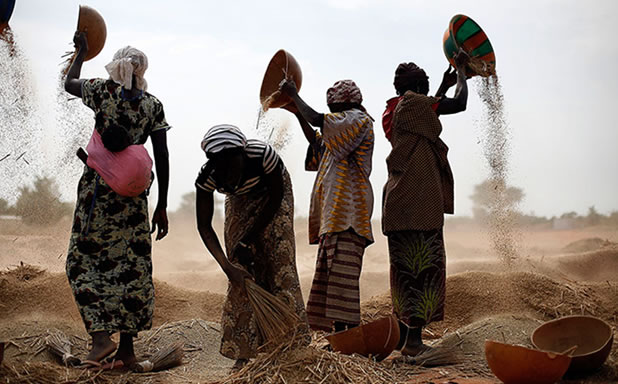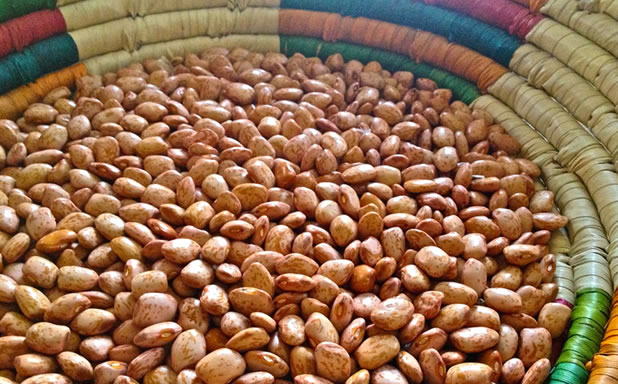Sep. 2006: “When you sort out the grains, it becomes pure.” – Tigrinya (Eritrea, Ethiopia) Proverb
Ukipepeta nafaka, inabaki iliyo safi. (Swahili)

Tigrinya (Eritrea, Ethiopia) Proverb
Background, Explanation, Meaning and Everyday Use
NOTE: Rendering this proverb in its original Tigrinya language is not possible here because it does not use the conventional English alphabet and Roman script. Tigrinya is an Ethiopian Semitic language and to write the Tigrinya characters one needs a Unicode Geez font (fidel script). Among the Tigrinya people of Eritrea and Ethiopia, grains especially maize and sorghum have over the years been important in their cultural and social economic realms. The Tigrinya people in Eritrea have emphasized the growing of grains particularly sorghum in the recent years following their independence from Ethiopian domination as a way to show their economic and livelihood independence. Today it is a grain that forms an important part of their culinary life. After harvesting sorghum, and in the course of its preparation for milling or pounding in preparation for meals, great care is taken to sort out impurities and make it clean and pure from impurities. This proverb has its conceptual origin in the process of the preparation of sorghum. As for the meaning of this Tigrinya proverb, its application is connected on the relationships among the Tigrinya themselves and their neighbors. The proverb means that that if you sort out a quarrel, it becomes clear. It touches on an important human truth about conflict that unless people in conflict, talk, discuss issues that divide them and iron out their differences, peace and coexistence cannot be realized. Hence the proverb emphasizes the need to dialogue to solve problems that divide people. It can be used to encourage talking to each other rather than talking at each other over our daily differences. Like sorting out sorghum (grains), quarrels should be laid bare on the table to “clear” them and shed light and clarify the issues that divide people.
 Biblical Parallels
Biblical Parallels
Isaiah 1:18 is the best verse in the Bible to capture in a direct and concise way the need for people to dialogue. The verse states plainly: “Come now, let us reason together, says the Lord.” There are other verses in the Bible that allude to the need for dialogue. In 1 Corinthians 6:1-11, Paul urge believers to uphold the value of dialogue instead of taking each other to courts of unbelievers when they disagree — emphasizing the need to resolve disputes in churches by even “appointing as judges men of little account in the church” (1 Corinthians 6:4).
Contemporary Use and Religious Application
This Tigrinya proverb can today be used to encourage people to discuss shared problems in order to solve them. Conflicts span all spheres of human existence — the family, nations, gender and even religions — and the proverb can be used in all these situations. Hence the proverb can be used in various conflict situations from the smallest social unit, the family, to even among warring nations. In Africa where there have been many conflicts especially of a political nature, this proverb is very relevant. Religiously, the proverb can be used to promote interreligious dialogue and avoidance of violent options among religions. Adherents of the various religions—Christians, Muslims and Jews—should be encouraged by the truth of the proverb on the need to discuss their differences to achieve peaceful co-existence and cooperation. NOTE: See Proverb No. 28 in the section “Peace-related Proverbs” in Selected Justice and Peace Proverbs from the Horn of Africa and the Great Lakes Region. Endangered African Proverbs Collections: A Continuation of the African Proverbs Project. Selected and Compiled by Joseph Kariuki. Nairobi, Kenya: Privately Duplicated, 2005. 14 pages. Go to: http://www.afriprov.org/resources/bibliogr.htm#EAPC_horn
Mr. Joseph Kariuki Muriithi
Assistant Moderator, African Proverbs, Sayings and Stories Website
c/o UMSG
P.O. Box 60875-00200
City Square, Nairobi, Kenya
E-Mail: kariukiprov@yahoo.co.uk
SPECIAL NOTE: This is the 100th “African Proverb of the Month.” A special celebration took place on 1 September, 2006 as part of an online chat room involving people around the world. Participants enjoyed a “virtual cake” (see photos) that is used for the month of December, 2007 in the
